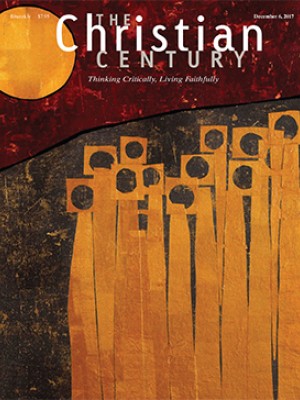Mary's joy is for everyone
The Magnificat rejoices in a God who acts within human history.

In narrating the events leading up to Jesus’ coming into the world, Luke not only presents an account of the circumstances and the people involved but also re-creates the atmosphere and the state of mind in which the events were experienced. Luke gives us a sense of what it felt like to be a part of these miraculous happenings.
One of the most prominent elements of this spiritual world is joy. The angel promises Zechariah that he will have “joy and gladness” at the birth of his son and that many will “rejoice” at his birth (1:14). The recurring Greek word is agalliasis, which indicates the eschatological jubilation that will burst forth at the time of the Messiah. At Mary’s greeting, the baby in Elizabeth’s womb “leaped for joy” (1:44). This note reaches its foremost high point in Mary’s exclamation: “My spirit rejoices [egalliasen] in God!” (1:47); it spreads out in the quiet joy of friends and relatives around the cradle of John, the precursor (see 1:58), finally and fully exploding at the birth of Christ in the cry of the angels to the shepherds: “We bring you good news of a great joy!” (2:10).
Read our latest issue or browse back issues.
Luke’s account is not about just a few scattered mentions of joy but rather about a steady stream of quiet, profound joy. It’s an example of the sober intoxication of the Spirit. The people’s joy is a true spiritual intoxication, but it is also sober. They do not exalt themselves; they are not concerned about having a more or less important role in the kingdom of God that is beginning. Nor are they concerned about seeing its end; Simeon, for instance, says that the Lord can now allow him to depart in peace and disappear.
Where does this joy come from? Of course, the ultimate fountain of joy is God, the Trinity. But we are in time and God is in eternity, so how can joy flow between these two dimensions that are so distant from each other?
We discover that the immediate source of joy is in time: it is the action of God in history—a God who acts. At the point at which a divine action “comes down” into history, it produces a vibration and a wave of joy that then spreads out “from generation to generation.” Each action of God is a miracle that fills heaven and earth with wonder: “Sing, O heavens, for the Lord has done it,” exclaims the prophet; “exult, O earth” (Isa. 44:23, 49:13). The joy that burst forth from Mary’s heart and from the other witnesses to the beginnings of salvation is wholly based on this point: God has rescued Israel! God has acted!
A quality of joy flows from the very moment it begins to operate—and even before it is operative, when it is announced as already determined by God and on the verge of being manifested. As humans know, it is the beginning or the eve of the feast that is the moment most fully charged with joy and hope. It is Saturday, says the Italian poet Giacomo Leopardi, that is the day of greatest joy in the village as people await Sunday and the holiday is ahead.
The Bible sings of the joy that is born from what God “is about to do”: “Be glad and rejoice forever in that which I am about to create” (Isa. 65:18). This is the kind of joy that flows from Mary’s greeting to Elizabeth and that releases the profound energy of the Spirit to make the mother and the baby in the womb rejoice. The baby in the mother’s womb is precisely the best symbol of this salvation in its nascent state: it is already present in the world even if it is not recognized and perceived except by the few who are directly involved in the event. It is the joy of expectation that every mother knows.
So even while it is God’s acting in history that occasions joy, Christian joy does not come from the outside but from the inside, like an alpine lake that is formed and fed by a spring that gushes up from its own depth and not by a river that flows into it from outside. It is “the fruit of the Spirit.” It is born of the mysterious and current action of God in the heart of a human being in the state of grace. Because of this, it is not extinguished even by tribulation (see 2 Cor. 7:4).
One needs to be aware of the cross to speak of this joy and to understand what is being talked about. Suffering puts us in contact with the supreme action of God in history, which is the cross of Christ. The cross is what keeps Christian joy sober. It is in suffering, said Francis of Assisi, that one experiences perfect joy.
I have spoken of joy according to God’s word. Human beings have their own idea of joy. Friedrich Schiller’s well-known text “Ode to Joy,” sung at the end of Beethoven’s Ninth Symphony, allows us to perceive by contrast the peculiar character of biblical joy. The joy that is sung about in the ode is the “beautiful spark of the gods, the daughter of Elysium.” People pass through the doors of her shrine “intoxicated with her fire,” and “all men become brothers where her gentle wing rests.” At the climax of enthusiasm, the hymn declares, “Be embraced, you millions! Here’s a kiss for all the world!”
If we turn from this ode to joy to Mary’s hymn of joy, the Magnificat, we notice the difference: “My soul,” Mary sings, “magnifies the Lord, . . . for he who is mighty has done great things for me.” Schiller’s joy is a subjective joy, a cry that arises from someone’s heart; it is a request, not a response. But Mary’s joy is objective and arises from a joyous occurrence. The perspective in “Ode to Joy” is mythological (joy is the “daughter of the gods”) and therefore fanciful and unreal; the biblical perspective is historical and based on facts, the actions of God that always and unfailingly have their effect.
The joy that people “partake of at Nature’s breast,” in Schiller’s words, is not meant for everyone: “Whoever has the good fortune to enjoy mutual friendship, / Whoever has taken a loving wife, let him join us in celebration!” As for the person who has not known these joys and who cannot rejoice, “let him steal away weeping,” the ode says. How distant this is from Jesus, who says, “Come to me, all who labor and are heavy laden, and I will give you rest!” Biblical joy is for everyone equally, and even in a special way for those who have not known many earthly joys.
Despite all its limitations, the human desire for happiness is nevertheless an extremely positive sign inscribed in our very nature. It bears witness that we are created to be happy. But our hearts will always be restless until they rest in the One who is the font of all happiness.
A version of this article appears in the December 6 print edition under the title “What joy is this?”





